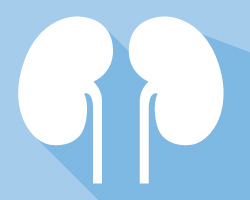
March 17, 2023—Your two kidneys may be small, but they are mighty.
These organs play a crucial role in keeping your body healthy and functioning well. Every 30 minutes, they filter out waste, toxins and excess fluid from your blood. They also:
- Help to control your blood pressure.
- Stimulate creation of new red blood cells.
- Keep your bones healthy.
- Regulate the blood chemicals we all need to live.
Unfortunately, the kidney's tiny filter cells, called nephrons, can be damaged over time. When that happens, it's called chronic kidney disease (CKD).
Today, about 37 million adults in the U.S. have CKD—and many don't know it. That's because symptoms usually only become clear at later stages of the disease and can be mistakenly linked with other causes, according to the National Kidney Foundation (NKF). The only way to know if you have CKD is to be screened.
Know your risk
You could be at risk of developing kidney disease if you are over age 60 or have:
- High blood pressure.
- Diabetes.
- Heart disease.
- A family history of kidney failure.
The Centers for Disease Control and Prevention notes that CKD is more common in women than in men. Black Americans, Hispanic/Latino Americans and Native Americans are also at higher risk.
If you have any of these risk factors, ask your doctor if you should be tested for CKD. Your doctor can check for the disease with tests of your blood or urine. In particular, a new blood test that measures cystatin C levels can give Black Americans more accurate results without relying on race as a test factor. Ask your healthcare provider about it.
Identifying CKD early is the most effective way to manage kidney disease and prevent additional health problems.
Spot the signs of kidney problems
Most people don't have symptoms of CKD until the later stages. But the NKF recommends letting your doctor know if you have any of these symptoms:
- Tiredness, low energy or difficulty concentrating.
- Having trouble falling and staying asleep at night.
- Dry or itchy skin.
- Urinating more often than before.
- Blood in your urine.
- "Foamy" urine.
- Persistent puffiness around your eyes.
- Swollen feet and ankles.
- Poor appetite.
- Muscle cramps.
Talk to your primary care provider
Your primary care provider can help you understand your risk for CKD. And they can help you take steps to lower it. That might include helping you manage your blood sugar and blood pressure or making other healthy changes, like stopping smoking.
Sources
- Centers for Disease Control and Prevention. "Get Tested for Chronic Kidney Disease." https://www.cdc.gov/kidneydisease/publications-resources/get-tested.html.
- Centers for Disease Control and Prevention. "Prevention and Risk Management." https://www.cdc.gov/kidneydisease/prevention-risk.html.
- National Institutes of Health. "NIH-Supported Study Suggests Alternative to Race-Based Kidney Function Calculations." https://www.nih.gov/news-events/news-releases/nih-supported-study-suggests-alternative-race-based-kidney-function-calculations.
- National Kidney Foundation. "10 Signs You May Have Kidney Disease." https://www.kidney.org/news/ekidney/august14/10_Signs_You_May_Have_Kidney_Disease.